At $100 million, it is the largest of the five bonds on the Nov. 5 ballot. While six other transportation bonds were voted on (and approved) since 2000, the need for this bond comes from a 2011 law that eliminated the indexing of the state gas tax.
Eric Russell provides the recent political history that contributed to the need to go to the voters to approve this general obligation bond, Question 3 on the Nov. 5 ballot (PDF), for long-term capital projects.
Approximately two-thirds of the Maine DOT’s budget is paid for with fuel taxes. Maine’s gas tax [31.5-cents per gallon] revenue increased steadily from 2003 through 2010, but it has dipped since and is expected to continue dropping, according to projections by the Maine Revenue Forecasting Committee, especially since the Republican-controlled Legislature passed a bill in 2011 that stopped indexing of the state gas tax to adjust for inflation.
In fact, a $51 million transportation bond for roads and bridges appeared on the ballot just last year. It was approved by 69 percent of the voters, writes Russell.
Indexing has proven to be a valuable way for state transportation funding to keep up with inflation, as we pointed to recently in Kentucky, where it enabled a 2.4-cent gas tax increase on July 1, as well as in Connecticut by 4-cents, and why Rep. Peter DeFazio (D-Ore.) has proposed that the federal 18.4-cent gas tax be indexed. Indexing was also one of the "Solutions to Fixing the Gas Tax Crisis" we posted here last year in a piece written by the The Wall Street Journal's Michael Totty:
"If the goal is to make sure that this (transportation) funding source is growing at roughly the same pace as our funding needs, tying the gas tax to some measure of inflation would be the way to do it," says Matthew Gardner, executive director of the Institute on Taxation and Economic Policy, a liberal think tank.
However, indexing is not immune from anti-tax politicians, as illustrated by Maine and other states where legislators object to automatic tax increases.
UPDATE (11/18/13): The measure passed with 70 percent of the vote, according to Land Line magazine, as did the other bond measures on the ballot. "Mainers have approved every transportation bond since the mid-’80s," writes Keith Goble, Land Line state legislative editor.
FULL STORY: Large Maine transportation bond has history on its side

Alabama: Trump Terminates Settlements for Black Communities Harmed By Raw Sewage
Trump deemed the landmark civil rights agreement “illegal DEI and environmental justice policy.”

Study: Maui’s Plan to Convert Vacation Rentals to Long-Term Housing Could Cause Nearly $1 Billion Economic Loss
The plan would reduce visitor accommodation by 25% resulting in 1,900 jobs lost.

Why Should We Subsidize Public Transportation?
Many public transit agencies face financial stress due to rising costs, declining fare revenue, and declining subsidies. Transit advocates must provide a strong business case for increasing public transit funding.

Paris Bike Boom Leads to Steep Drop in Air Pollution
The French city’s air quality has improved dramatically in the past 20 years, coinciding with a growth in cycling.

Why Housing Costs More to Build in California Than in Texas
Hard costs like labor and materials combined with ‘soft’ costs such as permitting make building in the San Francisco Bay Area almost three times as costly as in Texas cities.

San Diego County Sees a Rise in Urban Coyotes
San Diego County experiences a rise in urban coyotes, as sightings become prevalent throughout its urban neighbourhoods and surrounding areas.
Urban Design for Planners 1: Software Tools
This six-course series explores essential urban design concepts using open source software and equips planners with the tools they need to participate fully in the urban design process.
Planning for Universal Design
Learn the tools for implementing Universal Design in planning regulations.
Smith Gee Studio
Alamo Area Metropolitan Planning Organization
City of Santa Clarita
Institute for Housing and Urban Development Studies (IHS)
City of Grandview
Harvard GSD Executive Education
Toledo-Lucas County Plan Commissions
Salt Lake City
NYU Wagner Graduate School of Public Service




























